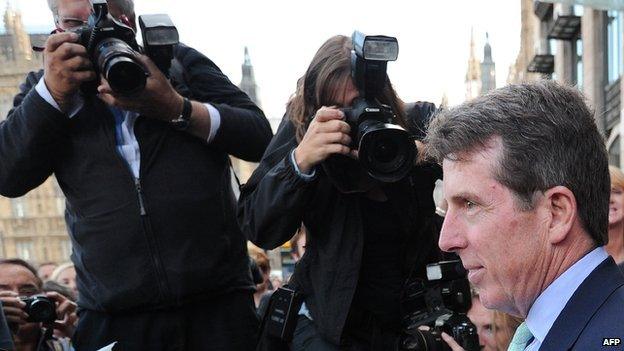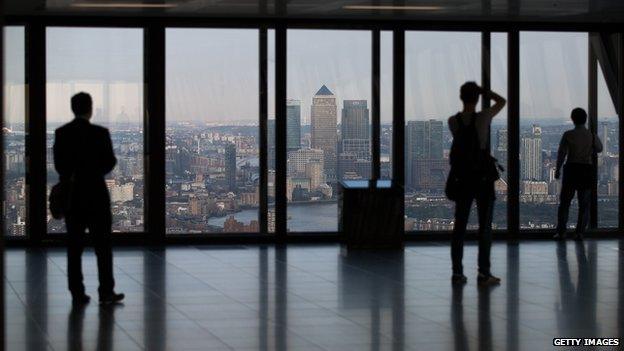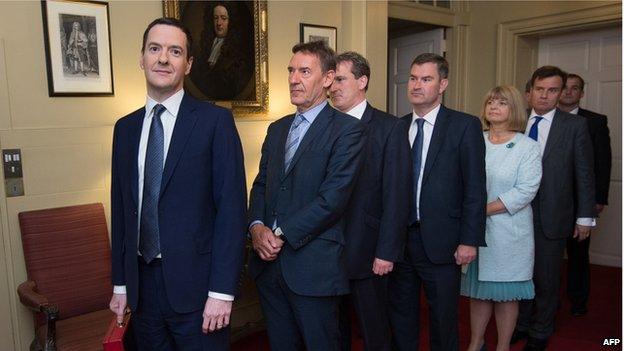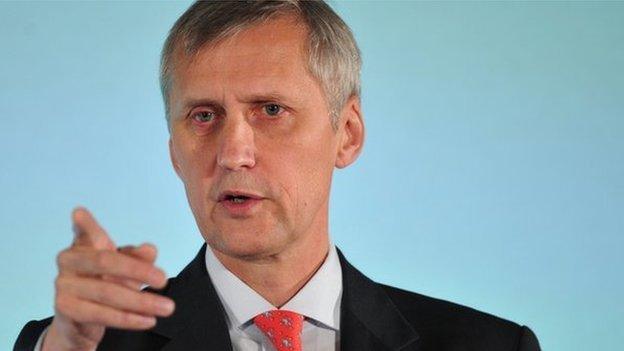Are we changing our minds about banks and bankers?
- Published
- comments

Former Barclays boss Bob Diamond called for forgiveness too soon
When he spoke in Parliament in 2011, former Barclays boss Bob Diamond claimed the time for apologising and remorse from lenders was over. He may have thought he had misjudged the mood when he was forced out of his bank a year later, under pressure from regulators.
But as Chancellor George Osborne presses for change at the City's watchdog after sacking its chief, Martin Wheatley, cuts back a key tax on banks, and starts selling the government's stake in Royal Bank of Scotland, are things now finally looking up for our financial institutions?
In spite of recent misdemeanours - not least this week's conviction of the trader Tom Hayes for rigging Libor rates - are we ready to forgive them?
"It looks like we may be approaching a tipping point," says Antony Elliott, director of Fairbanking Foundation, which campaigns to encourage banks to take more of an interest in their clients' financial well-being.
Banks have made inroads into mending dodgy sales practices and are better at helping their customers avoid fraud, he said. There is a lot more to do, though, he says. "The capacity to backslide is probably still great."
"A lot of people do need to improve their savings" and other aspects of their finances, which means a return to trust in lending institutions is needed, says Mr Elliott.
'Emerging from introspection'
Mr Wheatley is to leave the Financial Conduct Authority after two years, amid what Mr Osborne called a need for "different leadership". Mr Osborne said in his last budget earlier in July that the bank levy would be cut from its current 0.21% to 0.1% in 2021, by which time it would apply to banks' UK balance sheets only. This was seen as a boon particularly to Asia-focused HSBC.
Much of the change in tone from the authorities is pragmatic, says Thomas Moore, a fund manager who oversees more than £1bn of assets at pension firm Standard Life.

Banks can play a role in boosting economic growth through lending to businesses
"We are emerging from a period of introspection," he said. Banks have been forced to squirrel away more capital in recent years to reduce the risk of them needing a public bailout again. But now those capital numbers - an indicator of how hard a surprise financial knock a bank can take without going bust - look a lot healthier.
With this capital strength at a safer level, banks may be coaxed into making riskier loans, like to seedling enterprises, he says.
Stiff regulation from Mr Wheatley - who once said he would "shoot first" when it came to dealing with financial wrongdoing - may now be traded in for a desire for banks to lend more and help with Mr Osborne's growth targets for the economy.
"I think George Osborne spotted two or three years ago that the regulators' involvement in bank balance sheets and capital could have a detrimental impact on the UK's economic growth," says Mr Moore.
He thinks banks will now have an active part in helping shape the rules.
'Man in a hurry'
And Mr Osborne has reasons to want more lending. While mortgage lending is rising, lending to so-called non-financial businesses - the real economy - fell by £5.5bn in June, the sharpest decline in at least four years, according to the Bank of England.
Last month the chancellor said he was giving the Bank of England's Financial Policy Committee the job of pushing the importance of banks lending for productive investment.
"George Osborne has the power to make appointments and dismissals," says Standard Life's Mr Moore. "I think you can read into it that he's a man in a hurry and he wants to balance economic growth with a stable regulatory landscape."

Mr Osborne cut the bank levy and called on the Bank of England to push for lending for productive investment
So perhaps Mr Osborne is on the road to making peace with the banks. What about the rest of us?
"It will take time for public perception of banks to change and it will take time for trust to be rebuilt," says Leon Kamhi, a director at Hermes EOS, an advisor to large investors such as pension funds. "Talking to people in the street, there's still a lot of anger and mistrust."
'Reforms in place'
A constant dribble of fines and scandals demanding they repay ill-gotten revenues doesn't help. UK lenders have set aside more than £26bn for payment protection insurance, a figure that is still growing. In July, Royal Bank of Scotland put by another £459m, mainly for litigation costs. A day earlier, Barclays had said it reserved £250m to repay customers to whom they shouldn't have sold packaged bank accounts, a brand new mis-selling scandal.
Another awkward factor is this week's conviction of the first UK bank worker in relation to rigging markets. Former City trader Tom Hayes was found guilty at a London court of rigging global Libor interest rates, earning him 14 years in prison for conspiracy to defraud.
But behind the scenes, banks now have better governance in the form of boards with more experienced members and they are reforming how much and how often they pay their managers, says Mr Kamhi.
There is another way of thinking about the change of tune from government, though, says Prof Charles Goodhart from the London School of Economics.
Prof Goodhart says that Bank of England Governor Mark Carney has indicated he thinks that "the vast majority of the reforms necessary have been put in place, and we need to move into a period of implementation, rather than future reform; the reforms do what is necessary - we need to implement them.
"The pressure of one regulatory reform after another has come to an end."
'Always problems'
So, perhaps things seem calmer because the phase of new plans for the banks, such as the forthcoming separation of high street banks from investment operations, has come to an end. Regulators are merely getting down to it. But there will inevitably need to be some tinkering, he adds.
"You can't look at anything and say it's fixed, there will always be problems. The regulatory environment is a dynamic one, in which regulators make new regulations and the banking system adjusts to it in ways that are almost impossible to foresee in advance.
"That leads to new problems and they lead to new difficulties which leads to new regulation… it won't end here," says Prof Goodhart.
As for forgiveness from the banking public? "I think that's an impossible question to answer. If things go right it's a decade away," says Mr Kamhi.
- Published11 January 2011
- Published17 July 2015
